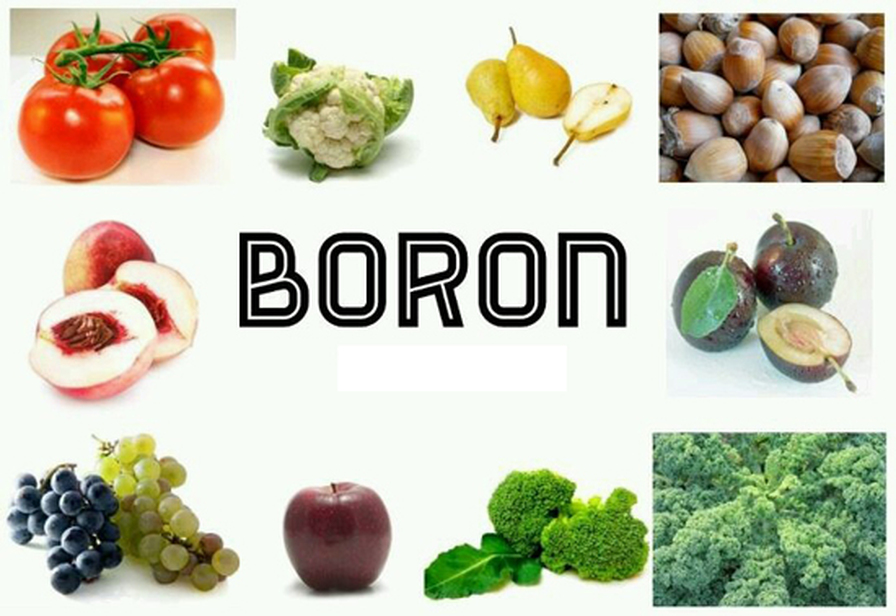
Boron is a vital trace mineral that is required for the normal growth and health of the body. Many dangerous conditions like arthritis and osteoporosis are naturally managed by Boron, and it helps to reduce menopausal symptoms as well. It is believed that boron improves the natural ability of the human body to absorb calcium and magnesium.
Important Sources of Boron:
Fruits like apples, oranges, red grapes, pears, plums, kiwis, sultanas, dates, as well as certain vegetables, soybeans and nuts are rich sources of boron. Chickpeas, borlotti beans, hazel nuts, currants, peanut butter, red kidney beans, tomato, lentils, olive, onion, potato wine, and beer are also notable sources of Boron. There are so many sources that there is no reason to ever suffer from a deficiency.
Pineal Gland detoxifier:
Boron is a detoxifier and pineal gland cleanser. It also works well as a fluoride remover. It is present in beets and best consumed by eating organic beets or trying beet powder mixed with spring water or other liquids/foods. You could try adding 1/4 tsp of sodium borate (Borax) to your green teas. An inexpensive source of boron can be purchased in most supermarkets as common borax (20 Mule Team). Borax should be taken in very small quantities in pure water, with as little as 1/32 to 1/4 of a teaspoon of borax to one liter of water. This mixture should be consumed in small quantities throughout the day has been found to be safe and effective. About 1/8 of a teaspoon with a pinch of sea salt has been found to be effective too. Another alternative to common borax is food grade sodium borate.
Health Benefits of Boron
Prevents Arthritis: Boron is a successful treatment option for arthritis and in more than 95% of cases, significant improvement was noticed by effectively increasing calcium integration into the cartilage and bone. With increasing age, the bones might become weak and porous and boron can stem this deterioration by ensuring that calcium levels are maximized and used effectively.
Reduces Severity of Rheumatoid Arthritis: Boron greatly reduces the allergenic and inflammatory conditions that are typically associated with rheumatoid arthritis.
Used for Body Building: Boron is able to enhance the testosterone levels in males; this quality is increasingly taken advantage of by male body builders and athletes. Although some weight lifters prefer to take boron supplements to enhance their testosterone levels, there has been no concrete evidence or explanation of the mechanism by which is helps to make them any more successful.
Helps in Bone Health: The bone building capacities of boron are often ignored in favor of calcium. However, boron actually works in unison with calcium to strengthen the bones. It plays a very important role in minimizing the risks of osteoporosis and arthritis. Boron also helps in the metabolism of minerals that are involved in bone development such as calcium, magnesium and copper. Furthermore, boron affects various hormones, including estrogen and testosterone, which are also related to the overall health of the body’s bones.
Estrogen Production: Boron can improve the production of estrogen in menopausal women, and can bring back their sex drive within a few days of treatment. Boron increases the level of natural sex hormones in the body, thereby reducing the need for hormone replacement therapy or other pharmaceutical solutions.
Embryonic development: Boron appears to be essential for reproduction and the development of the fetus, although not much information is available on this property, and research is ongoing.
Prevents Post-Menopausal Osteoporosis: Boron can ease the symptoms such as hot flashes and night sweats that are typically associated with menopause, and it ensures that mineral levels remain at appropriate levels, since post-menopausal women often suffer from hormonal imbalances that can skew many of the body’s most important systems.
Cancer therapy: Boron neutron capture agents are used for cancer therapy and in the development of strong enzyme inhibitors. Boron compounds are also used as antibody mimics that can easily identify biologically important saccharides.
Proper Cell Membrane Function: Boron plays an important role in maintaining cellular and organ membrane functions and in stabilizing the hormone receptors so the bodily processes go smoothly.
Prevents Blood Clots: It is believed that boron can influence some of the blood clotting factors in the body. However, mores studies need to be done to authenticate this finding, which would make boron a major ally in the fight against heart disease!
Congestive Heart Failure: Boron can significantly alleviate the difficulties caused by congestive heart failure conditions.
Lowers Plasma Lipid Levels: Boron helps to reduce lipid accumulation and enables the removal of cholesterol through various means, thereby reducing the chances of developing conditions like atherosclerosis and blood clots, and protecting the body against strokes and heart attacks.
Decreases Fungal Infections: Boron protects the body from a host of parasitic attacks such as Candida Albicans and other nasty fungal infections.
Brain Function and Cognitive Performance: Studies have shown that boron can enhance brain function, eye-hand coordination, short-term memory and the powers of concentration.
Enzyme Inhibitors: Boron might inhibit some harmful enzymes from forming or acting, while simultaneously serving as a co-factor for other beneficial enzymatic reactions.
Cabbage contains 145 ppm (parts per million) boron on a dry-weight basis
Dandelion contains 125 ppm boron meaning that just ten grams (just under 7 tablespoons) of dried dandelion shoots could provide more than 1 milligram of boron.
Parsley is rich in boron and it takes about 3 ounces of dried parsley to provide 3 milligrams of boron.
Apples consumed raw and with the skin contain 2.73mg of boron per kg on a fresh weight basis.
Other food sources of boron include dried fruits, grape juice, cherries, avocados and broccoli.